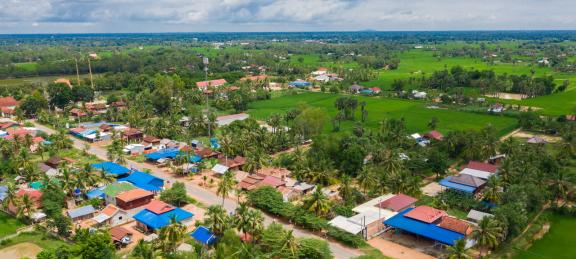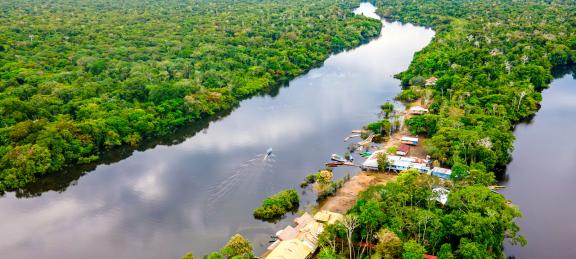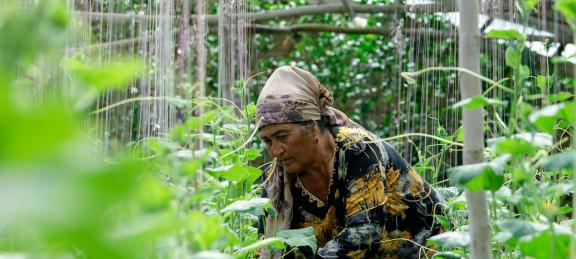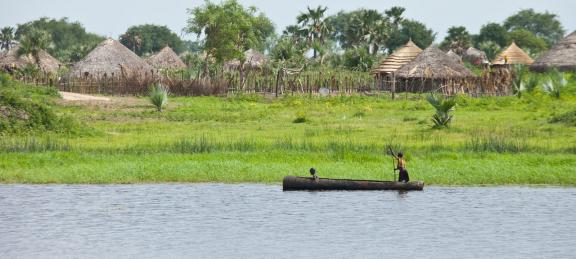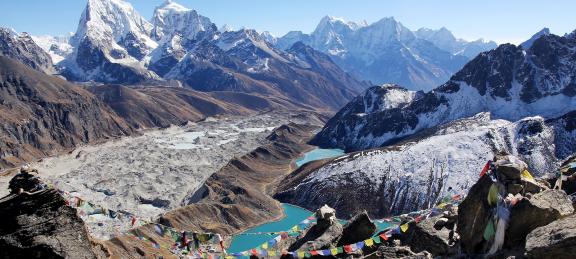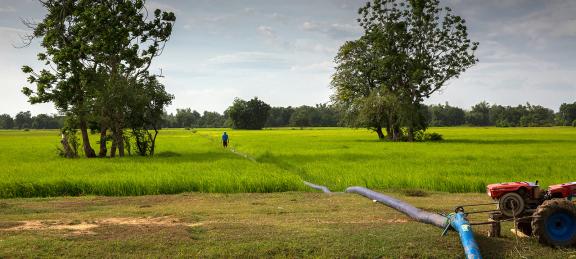&
&
Adaptation
The context
Ecosystems consist of plants, animal and microorganism communities (including for example, rainforests, coral reefs, agricultural land and managed forests), while ecosystem goods and services are the benefits to human society that ecosystems provide (for example, water provision and flood and storm protection). Ecosystem degradation and the impacts of climate change release the carbon that is stored in biomass and soils, and increase the risk of ecological collapse. Land-use change, predominately due to tropical deforestation and burning contributes 13 per cent of annual global emissions. Land degradation worldwide has already reduced the productivity of nearly one-quarter of the global land surface. It has impacted the wellbeing of about 3.2 billion people, and cost 10 per cent of annual global gross domestic product in lost ecosystem services.
The vision for a paradigm shift in ecosystems is to secure their resilience and functionality, and to maintain ecosystem services under conditions of climate change. Healthy ecosystems play an important role in storing carbon and protecting ecosystems bring a wide-range of co-benefits, including improving food security, supporting livelihoods, and promoting human health Efforts to protect ecosystems must consider local people’s livelihoods, and be socially as well as ecologically sustainable. Many developing country citizens rely on family farming and the use of natural resources as their primary form of subsistence and family income, so nature-based climate solutions need to include livelihood-boosting co-benefits.
However, there are currently multiple barriers to investing in ecosystems and nature-based solutions and achieving the required paradigm shift in ecosystems. These barriers range from high upfront investment costs to poor integration of the values of ecosystem goods and services and their economic benefits into public and private financial planning. Strong perceptions of investment risks are compounded by knowledge gaps and a dearth of institutional capacity and ability to monitor and assess the current state of ecosystems.
GCF's unique role
The Green Climate Fund (GCF) is the world’s largest dedicated fund helping developing countries reduce their greenhouse gas emissions and enhance their ability to respond to climate change in line with the Paris Agreement. GCF invests across four transition areas: the built environment; energy and industry; human security, livelihoods and wellbeing; and land-use, forests and ecosystems.
GCF scales up investment in ecosystems by supporting large-scale measures that protect, restore and manage ecosystems to enhance adaptation and reduce emissions. In order to do this, GCF focuses on two main areas: ecosystem-based management of terrestrial and freshwater ecosystems; and ecosystem-based coastal and marine zone management.
In each of these areas, GCF achieves results by:
- Supporting transformational planning and programming. This includes assisting developing countries formulate integrated climate and sustainable development strategies and policies that are transparent and equitable.
- Catalysing climate innovation in policy, institutions, business, technology and finance. Key climate innovations include developing and piloting new approaches to properly value ecosystem services so that they can be recognised in decision- making processes and valued by new economic markets.
- Mobilising finance at scale by de-risking investments and strengthening domestic financial systems and institutions. Using a range of financial instruments to, GCF supports countries unlock national and local capital and deepen access to commercial or “niche” markets relevant to sustainable use of ecosystems. GCF also supports nature-based investment funds, green bonds and equity for climate action projects.
- Expanding and replicating knowledge by sharing lessons, traditional knowledge, scientific advances and standards about ecosystems services and their climate benefits.
GCF’s investments are anchored in our core principle of country ownership, and are aligned with existing national planning processes (e.g. Nationally Determined Contributions (NDCs), Technology Need Assessments (TNAs) and National Adaptation Plans (NAPs). GCF supports countries through its Readiness programme by providing grants to help countries develop bankable investment plans based upon their NDCs.
Partnerships have formed the basis of GCF’s business model since it was established. GCF investments can leverage and scale up existing sectoral initiatives, coalitions and platforms when planning interventions, creating multiplier effects at scale and promoting joint learning and knowledge transfer within the Ecosystems sector.
Resources

Thematic brief: Ecosystems & ecosystem services
27 May 2021
Ecosystems consist of plants, animal and microorganism communities (including for example, rainforests, coral reefs, agricultural land and managed forests), while ecosystem goods and services are the benefits to human society that ecosystems provide (for example, water provision and flood and storm protection). Ecosystem degradation and the impacts of climate change release the carbon that is stored in biomass and soils, and increase the risk of ecological collapse. Land-use change, predominately due to tropical deforestation and burning contributes 13 per cent of annual global emissions.

Thematic brief: Oceans
26 Oct 2021
Oceans and coastal ecosystems cover more than 70 percent of the Earth’s surface, providing a natural asset of enormous significance to protect our planet, preserve and enhance local economic growth, promote regional stability and conserve global biodiversity. This generates vital ecosystem goods and services that support our future, such as climate and temperature regulation, absorption of carbon emissions, fisheries, food security, coastal protection, tourism services and jobs.

SAP Technical Guidelines: Ecosystems and ecosystem services
21 Feb 2023
The publication provides technical guidance for the preparation of SAP proposals. The thematic area of ecosystems and ecosystem services encompasses all natural environments and the productive uses that are based on them. This can range from environments not directly impacted by human activities – for example, remote rainforests, alpine regions or coral reefs – to environments that are intensively managed – such as agricultural areas or managed forests for timber production. Given that there are thematic areas specifically addressing water security, agriculture and food production, and forest management, the emphasis in this thematic area is on natural or less intensively managed environments.
Case studies
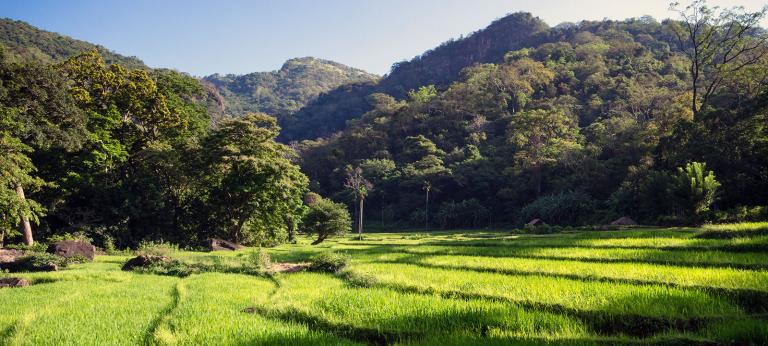
Introducing agro-ecological farming methods to upstream and downstream communities in Sri Lanka
Sri Lankan farmers are suffering from climate-induced irrigation problems and drinking water shortages. Rising temperatures and changing seasonal rainfall are accelerating the intensity and frequency of both droughts and floods. Increasing erosion upstream is causing flooding and food insecurity downstream. This project is improving farm- and land-management practices through agro-ecology, retaining both water and topsoil upstream, to benefit people as well as catchments in the Knuckles Mountains highlands and lowlands. See project details >
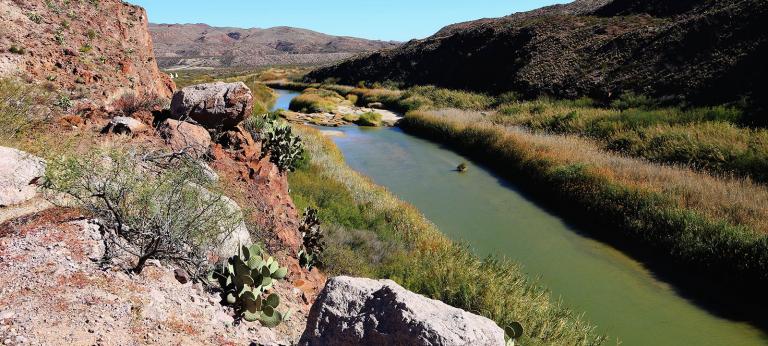
Ecological river restoration for climate change adaptation in Mexico
Mexico’s mountain ranges, valleys and coastal plains are increasingly vulnerable to landslides, floods and droughts. In the two drainage basins targeted in this project, important population centres downstream are being exposed to these effects of climate change. The rivers themselves have become highly degraded and polluted, and the remaining cloud forests in the upper catchments are being fragmented and lost, as people move to farm in higher altitudes due to warming at lower levels. This project capitalises on ecological lessons learned in restoring rivers. This is a SAP project (Simplified Approvals Process) which can be upscaled and replicated in the future. See project details >
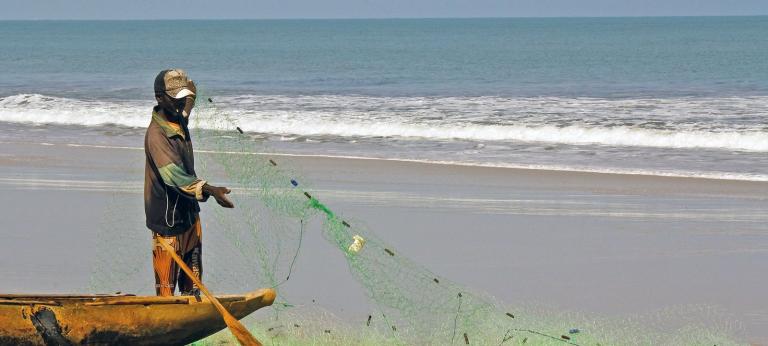
Blue Action Fund: An Ecosystem Based Adaptation Programme in the Western Indian Ocean
This programme is building resilience in vulnerable coastal populations in Tanzania, Mozambique, Madagascar and South Africa, where climate change impacts are intensifying rapidly. Mozambique was hit by two major cyclones in 2019, while the other countries are facing increasing threats from cyclones and tropical storms. This programme pools adaptation sub-projects by non- governmental organisation (NGOs) under the Blue Action Fund to improve climate-resilient coastal zone management in this diverse region, including the management of mangroves, coral reefs and seagrass beds which provide protection from storm surges and coastal erosion. The programme will leverages additional co-financing from NGOs, while grant recipients are required to provide 25 per cent of the budget of their projects. See project details >
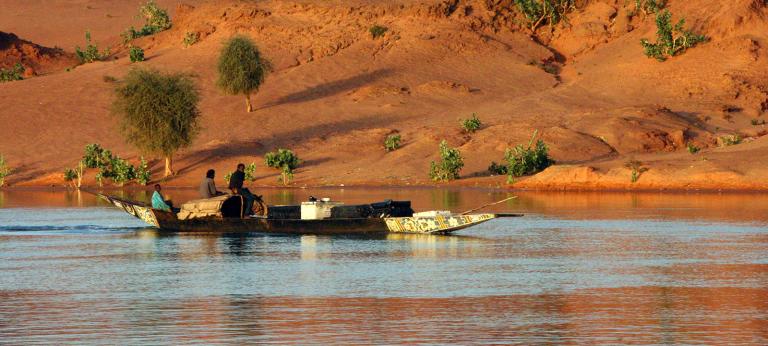
Building the resilience of smallholder farmers and ecosystems in Sahelian Countries of the Great Green Wall
The Sahel region of Western Africa is exceptionally vulnerable to climate change with worsening impacts of rising temperature, rainfall variability and extreme weather events. Reliance on rain-fed farming and pastoralism for income and subsistence means that poor farmers are exposed to the constant threat of drought, increasing desertification and loss of livelihoods. The programme reverses desertification and scales up the resilience and adaptive capacities of smallholder farmers and rural communities of seven least developed countries (LDCs) in this region. Capacity building and institutional development on integrated climate risks reduces obstacles to accessing agricultural insurance for both governments and smallholder farmers, building resilience and strengthening climate weather information services. See project details >


